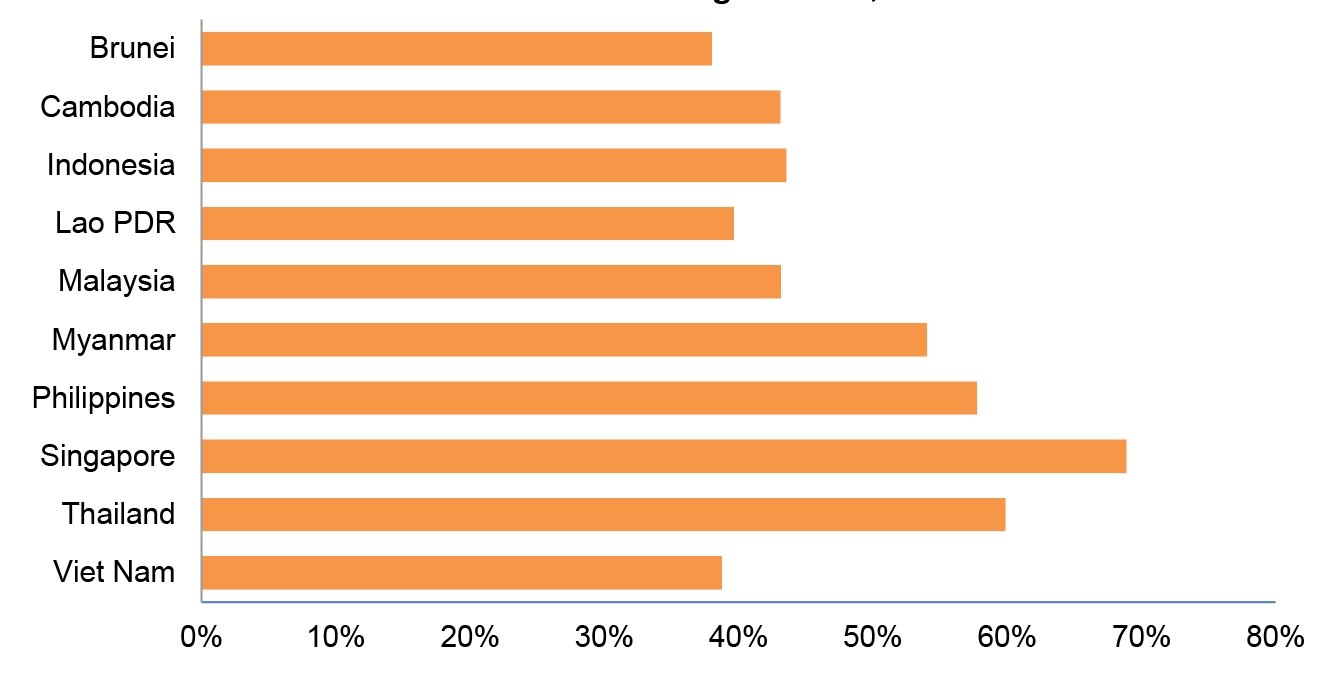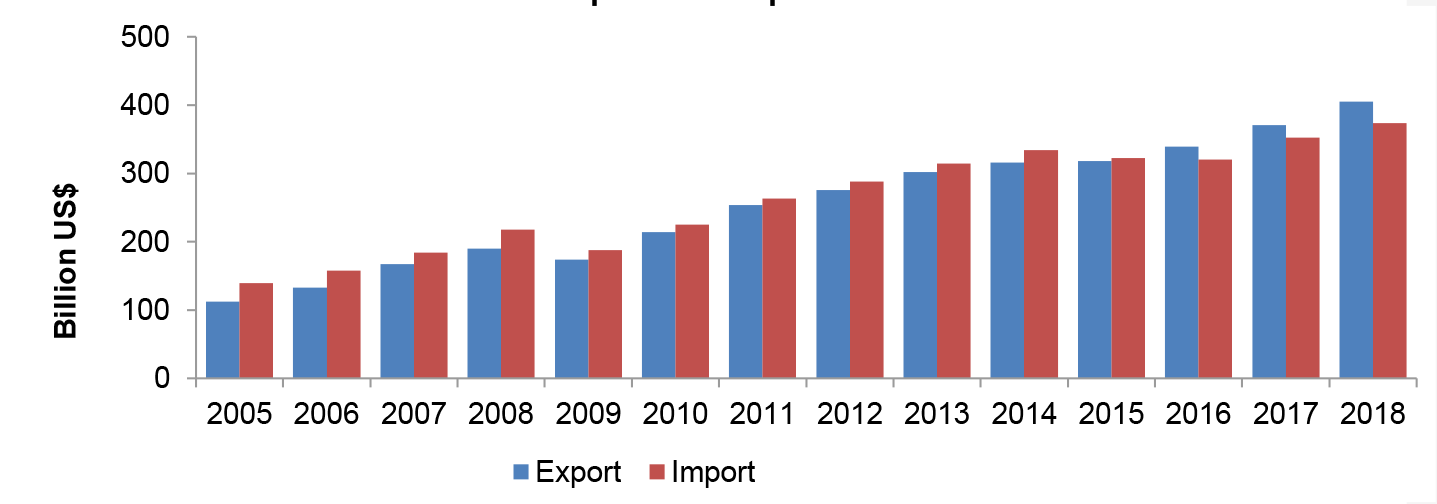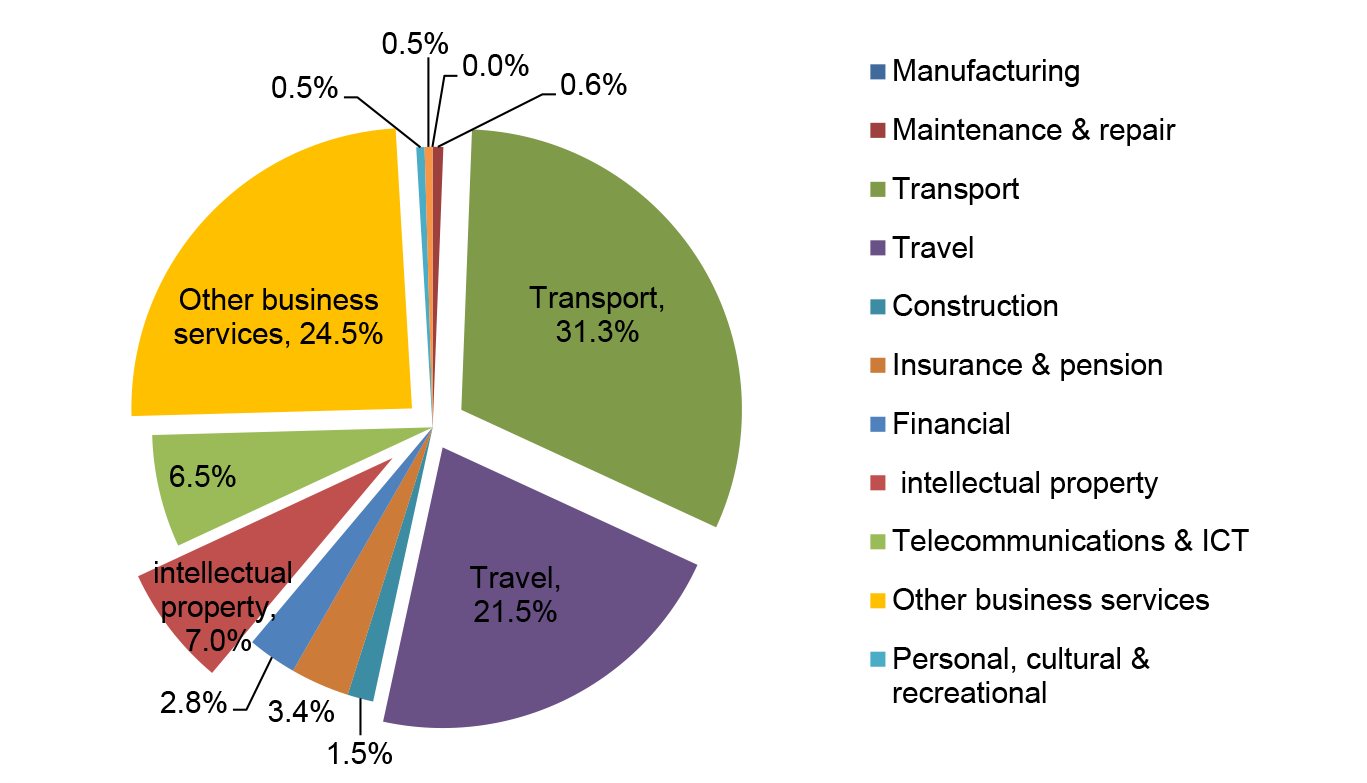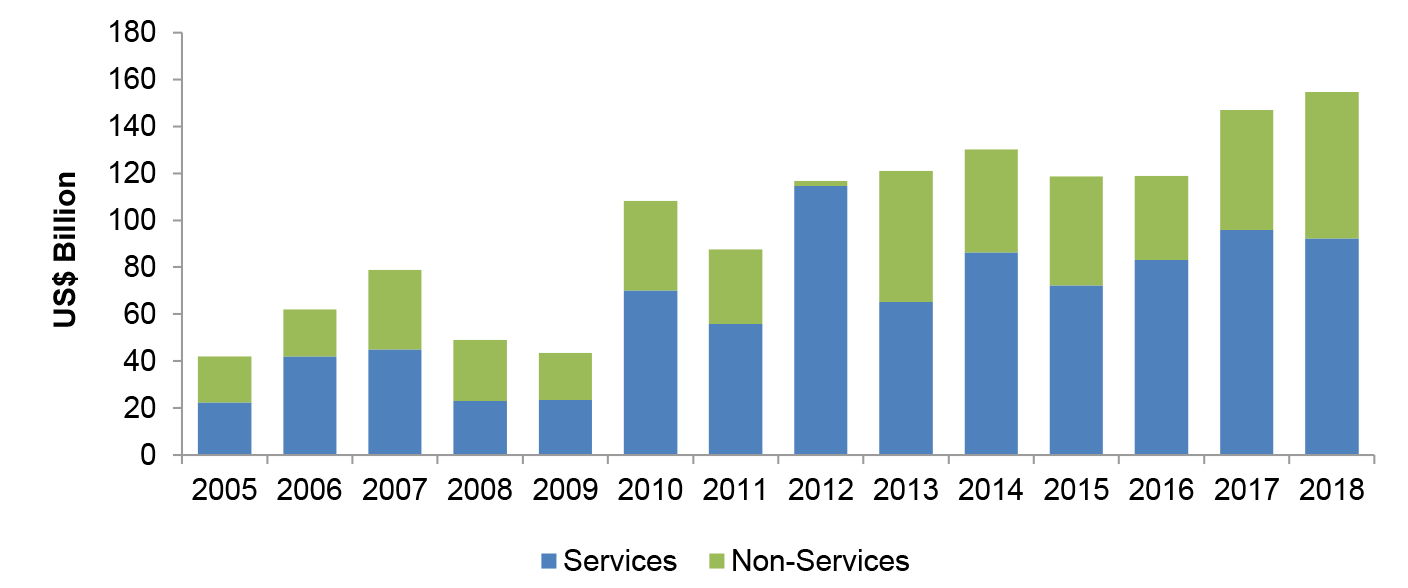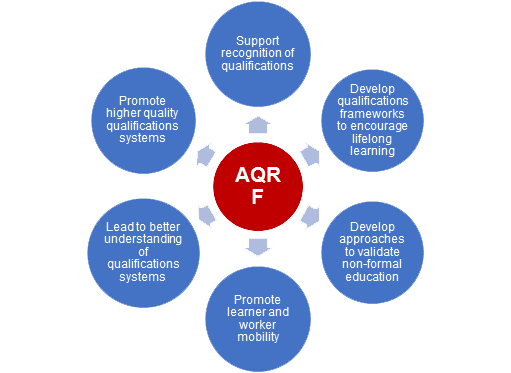Trade in Services in ASEAN
Services is a sizeable and continuously expanding component of GDP in ASEAN economies. As of 2018, services sector represents between 38% and 69% of ASEAN Member States’ Gross Domestic Product (GDP).
Chart 1
Services as Percentage of GDP, 2018
(Source: ASEANStats, 2019)
Except for the decrease of trade during the 2008-2009 global economic crisis, ASEAN’s services export grew steadily from US$ 112.5 billion in 2005 to US$ 404.9 billion in 2018, at an annual average growth rate of 10.7%; while ASEAN’s services import also increased from US$ 139.6 billion to US$ 373.8 billion, at an annual average growth rate of 8.3%. Note also that since 2016, ASEAN has become a net exporter of services.
Chart 2
ASEAN’s Export and Import of Services
(Source: ASEANStats, 2019)
Travel, transport, and other business services dominate the export and import of services of ASEAN in general. ASEAN’s export is dominated by travel services, while ASEAN’s import is dominated by transport services. In the distant fourth place, ASEAN’s export is also contributed by financial services, while ASEAN’s import comes from charges for the use of intellectual property. These services sectors are classified based on the IMF Balance of Payments Manual, 6th Edition.
ASEAN’s Services Export by Sectors
(2018 Data out of Total Export of US$ 404.9 billion)
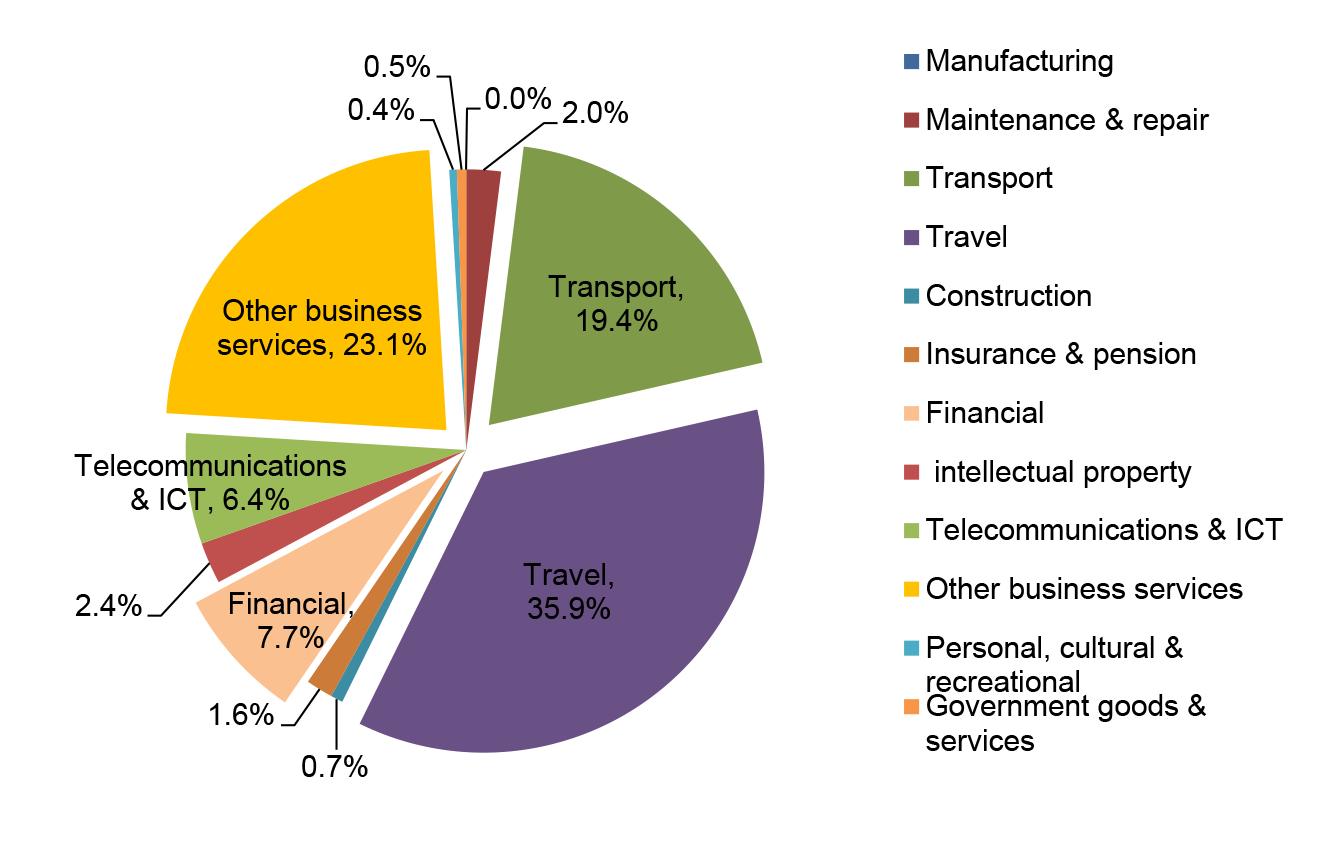
(Source: ASEANStats, 2019)
Chart 4
ASEAN’s Import Export by Sectors
(2018 Data out of Total Import of US$ 373.8 billion)
(Source: ASEANStats, 2019)
Services sectors have also been traditionally the largest recipient of Foreign Direct Investments (FDI) into the region. With few exceptions, throughout the last 15 years, services sectors have attracted about 60 or higher percentage of total FDI flow into ASEAN.
Chart 5
FDI Inflow to ASEAN by Sector
ASEAN Framework Agreement on Services
Recognising the growing importance of trade in services, ASEAN Member States officially launched their joint effort to work towards free flow of trade in services within the region through the ASEAN Framework Agreement on Services (AFAS), which was signed on 15 December 1995 by ASEAN Economic Ministers (AEM) during the 5thASEAN Summit in Bangkok, Thailand.
AFAS provides broad guidelines for ASEAN Member Countries to progressively improve Market Access, and ensures equal National Treatment for services suppliers in ASEAN. All AFAS rules are consistent with international rules for trade in services provided by the General Agreement on Trade in Services (GATS) of the World Trade Organisation (WTO). AFAS aims at substantially eliminating restrictions to trade in services among ASEAN Member States to improve the efficiency and competitiveness of ASEAN services suppliers. Liberalisation of services trade under AFAS is also directed to achieve commitments beyond Member States’ commitments under the GATS.
Since the signing of AFAS, officials of ASEAN Member States have been working to achieve the objective of AFAS to create a freer trade in services within the region. This was implemented through rounds of negotiations, each resulting in packages of commitments, which stipulates the commitments of each ASEAN Member State in various services sector/sub-sector and mode of supply.
The works on services integration in ASEAN are undertaken under the purview of ASEAN Economic Ministers (AEM). Following the decision of AEM at an Informal Meeting held on 28 June 1999 in Auckland, New Zealand, ASEAN Finance Ministers (AFMM) and ASEAN Transport Ministers (ATM) subsequently took the lead in the liberalisation of financial services and air transport services, respectively. Subsequently, following the signing of the Protocol to Amend the Framework Agreement on the ASEAN Investment Area on 14 September 2001 in Ha Noi, Viet Nam, the works on services incidental to manufacturing, agriculture, fishery, forestry, and mining and quarrying were transferred to the investment track under the purview of ASEAN Investment Area (AIA) Council. This transfer is made in order to ensure coherence its works related to investment in the manufacturing, agriculture, fishery, forestry, and mining and quarrying sectors.
ASEAN Economic Community (AEC) Blueprint
A significant milestone in the history of services liberalisation in ASEAN, as also in other economic areas in ASEAN, is the adoption of the ASEAN Economic Community (AEC) Blueprint by ASEAN Leaders at the 13th ASEAN Summit on 20 November 2007 in Singapore. Through the AEC Blueprint, ASEAN formalised and stepped up its effort to further liberalise towards the goal of free flow of services, according to the bi-annual targets and thresholds laid out under this AEC Blueprint as well as additional parameters set forth by the Ministers.
Following the launch of ASEAN Community in 2015, ASEAN Leaders adopted the ASEAN Economic Community Blueprint 2025 during the 27th ASEAN Summit on 22 November 2015 in Kuala Lumpur Malaysia. In the area of trade in services, the ASEAN Economic Community Blueprint 2025 affirmed ASEAN’s intent to further broaden and deepen services integration, ASEAN’s integration into the global supply chains in both goods and services, and enhance ASEAN Member States’ competitiveness in services. It also stipulated that ASEAN’s next agenda is to negotiate and implement the ASEAN Trade in Services Agreement (ATISA) as the legal instrument for further integration of services sectors in the region.
All of these contribute to progressively deeper level and wider coverage of ASEAN Member States’ commitment to substantially eliminate restrictions to trade in services among them.
The ASEAN Trade in Services Agreement (ATISA) has now been concluded and its signing is expected to be completed soon upon completion of the domestic approval of the remaining Member State to sign the agreement.
What Has Been Achieved?
ASEAN has concluded ten packages of commitments under the AFAS signed by the AEM through five rounds of negotiations since 1 January 1996. These packages provide for details of commitments of each ASEAN Member State in various services sectors and subsectors.
In addition, there has also been seven additional packages of commitments in financial services under the AFAS signed by the AFMM (the second, third, fourth, fifth, sixth, seventh and eighth Packages of Commitments of Financial Services under the AFAS) and eight additional packages of commitments in air transport under the AFAS signed by the ATM (the fourth, fifth, sixth, seventh, eighth, ninth, tenth, and eleventh Packages of Commitments on Air Transport Services under the AFAS).
Movement of Natural Persons (MNP)
In November 2012, ASEAN Economic Ministers (AEM) signed the ASEAN Agreement on Movement of Natural Persons (MNP) in Phnom Penh, Cambodia. The schedules of commitment under the MNP Agreement supersede Mode 4 commitments of the earlier AFAS packages. The MNP Agreement enters into force on 14 June 2016 following completion of its ratification by all AMS. Pursuant to Article 7 of this Agreement, initial discussions to review and update the schedules of commitments under this Agreement has started.
Mutual Recognition Arrangements
Mutual Recognition Arrangements (MRAs) forms another important area of ASEAN cooperation on trade in services. MRAs are enabling tools to allow mutual recognition of qualifications of professional services suppliers by signatory ASEAN Member States to facilitate mobility of professional services providers in the region.
At present, ASEAN has concluded MRAs in 7 (seven) professional services signed by the ASEAN Economic Ministers (AEM):
- MRA on Engineering Services signed on 9 December 2005 in Kuala Lumpur, Malaysia;
- MRA on Nursing Services signed on 8 December 2006 in Cebu, the Philippines;
- MRA on Architectural Services and Framework Arrangement for the Mutual Recognition of Surveying Qualifications both signed on 19 November 2007 in Singapore.
- MRA on Medical Practitioners signed on 26 February 2009 in Cha-am, Thailand.
- MRA on Dental Practitioners signed on 26 February 2009 in Cha-am, Thailand.
- MRA on Accountancy Services signed on 13 November 2014 in Nay Pyi Taw, Myanmar.
ASEAN Member States are actively implementing these MRAs, which are now in various stages of progress. Further details on the three MRAs related to the healthcare sector (i.e. nursing, medical practitioners and dental practitioners) can be found in the Healthcare Services page.
ASEAN Qualifications Reference Framework (AQRF)
Another ASEAN initiative to facilitate mobility of people is the ASEAN Qualification Reference Framework (AQRF). AQRF is a common reference framework to compare qualifications throughout all education and training sectors across all AMS. With AQRF, countries could reference their national-level qualifications framework or system to this ASEAN-level framework. In this way, AQRF supports and enhances each country’s National Qualification Framework (NQF) as well as promotes transparency and higher quality qualifications systems. Further information is available on the AQRF page here.
Sectoral Bodies
The works on services integration in ASEAN are overseen by the ASEAN Economic Ministers (AEM). Following the decision of AEM at an Informal Meeting held on 28 June 1999 in Auckland, New Zealand, ASEAN Finance Ministers (AFMM) and ASEAN Transport Ministers (ATM) subsequently took the lead in the liberalisation of financial services and air transport services, respectively. Since March 2015, ASEAN Finance Ministers met jointly with the Central Bank Governors, and renamed as ASEAN Finance Ministers’ and Central Bank Governors’ Meeting (AFMGM).
Following the signing of the Protocol to Amend the Framework Agreement on the ASEAN Investment Area on 14 September 2001 in Ha Noi, Viet Nam, the works on services incidental to manufacturing, agriculture, fishery, forestry, and mining and quarrying were transferred to the investment track under the purview of ASEAN Investment Area (AIA) Council. This transfer is made in order to ensure coherence its works related to investment in the manufacturing, agriculture, fishery, forestry, and mining and quarrying sectors.
At the working level in implementing the various works under the AFAS, the Coordinating Committee on Services (CCS) was established in January 1996 to implement the agreement. The CCS reports to the AEM through the Senior Economic Officials Meeting (SEOM). For financial services, the works are undertaken by the Working Committee on Financial Services Liberalisation (WC-FSL) who reports to the AFMGM through the ASEAN Finance and Central Bank Deputies Meeting (AFCDM). For air transport services, the works are under taken by the Air Transport Working Group (ATWG), who reports to ATM through the Senior Transport Officials Meeting (STOM). For the 5 incidental services, the works are undertaken as part of the works under the Coordinating Committee on Investment (CCI) who reports to the AIA Council through SEOM.

Sectoral Working Groups under CCS
Under the CCS there are several Sectoral Working Groups (SWG) who meet back-to-back with the CCS Meetings. The currently active SWG are:
- Business Services Sectoral Working Group (BSSWG)
- Logistics and Transport Services Sectoral Working Group (LTSSWG)
- Healthcare Services Sectoral Working Group (HSSWG)
- Telecommunication and Information Services Sectoral Working Group (TISSWG)
The implementing bodies of the 7 MRAs specified above reports to the CCS through BSSWG and HSSWG respectively. The following charts shows the reporting lines of the implementing bodies of 7 MRAs to the CCS:

- AAC: ASEAN Architect Council
- AAEC: ASEAN Architect Education Committee
- ACPACC: ASEAN Chartered Professional Accountant Coordinating Committee
- ACPECC: ASEAN Chartered Professional Engineering Coordinating Committee
- AJCCN: ASEAN Joint Coordinating Committee on Nursing
- AJCCM: ASEAN Joint Coordinating Committee on Medical Practitioners
- AJCCD: ASEAN Joint Coordinating Committee on Dental Practitioners
- SURVEYING: Surveying Competent Authorities of the Framework Arrangement for the Mutual Recognition of Surveying Qualifications
Highlights
ASEAN Trade in Service Agreement (ATISA)
ASEAN Services Facilitation Framework (ASFF)
ASEAN Agreement on The Movement of Natural Persons
- ASEAN Agreement on the Movement of Natural Persons, Phnom Penh, Cambodia, 19 November 2012
- ASEAN MNP Schedule – Brunei Darussalam, 2012
- ASEAN MNP Schedule – Cambodia, 2012
- ASEAN MNP Schedule – Indonesia, 2012
- ASEAN MNP Schedule – Lao PDR, 2012
- ASEAN MNP Schedule – Malaysia, 2012
- ASEAN MNP Schedule – Myanmar, 2012
- ASEAN MNP Schedule – Philippines, 2012
- ASEAN MNP Schedule – Singapore, 2012
- ASEAN MNP Schedule – Thailand, 2012
- ASEAN MNP Schedule – Vietnam, 2012
- Protocol to amend the ASEAN Agreement on The Movement of Natural Persons, Manila, Philippines, 7 March 2024
- ASEAN MNP Schedule – Brunei Darussalam, 2022
- ASEAN MNP Schedule – Cambodia, 2022
- ASEAN MNP Schedule- Indonesia, 2022
- ASEAN MNP Schedule – Lao PDR, 2022
- ASEAN MNP Schedule – Malaysia, 2022
- ASEAN MNP Schedule – Myanmar, 2022
- ASEAN MNP Schedule – Philippines, 2022
- ASEAN MNP Schedule – Singapore, 2022
- ASEAN MNP Schedule – Thailand, 2022
- ASEAN MNP Schedule – Viet Nam, 2022
ASEAN Framework Agreement on Services
- ASEAN Framework Agreement on Services, Bangkok, 15 December 1995
- Protocol to Amend the ASEAN Framework Agreement on Services, Phnom Penh, Cambodia, 2 September 2003
- Protocol to Implement Package of Commitments Under the ASEAN Framework Agreement on Services
- Initial Package (1997)
- Second Package (1998)
- Third Package (2001)
- Fourth Package(2004)
- Fifth Package (2006)
- Sixth Package (2007)
- Seventh Package(2009)
- Eighth Package (2010)
- Ninth Package (2015)
- Tenth Package (2018)
- Schedule of AFAS Commitments (Member Countries’ Horizontal Commitments, Schedules of Specific Commitments and the List of Most-Favoured Nation Exemptions)
Mutual Recognition Arrangement
- ASEAN Mutual Recognition Arrangement on Engineering Services, Kuala Lumpur, 9 December 2005
- ASEAN Mutual Recognition Arrangement on Nursing Services, Cebu, Philippines, 8 December 2006
- ASEAN Mutual Recognition Arrangement on Architectural Services, Singapore, 19 November 2007
- ASEAN Framework Arrangement for the Mutual Recognition of Surveying Qualifications, Singapore, 19 November 2007
- ASEAN Mutual Recognition Arrangement on Medical Practitioners, Cha-am, Thailand, 26 February 2009
- ASEAN Mutual Recognition Arrangement on Dental Practitioners, Cha-am, Thailand, 26 February 2009
- MRA on Accountancy Services signed on 13 November 2014 in Nay Pyi Taw, Myanmar.
Priority Integration Sectors
- ASEAN Sectoral Integration Protocol for the Logistics Services Sector, Makati City, Philippines, 24 August 2007
- Appendix 1 – Roadmap for the Integration of Logistics Services
- Protocol to Amend Article 3 of the ASEAN Framework (Amendment) Agreement for the Integration of Priority Sectors, Makati City, Philippines, 24 August 2007
ASEAN minus X Agreements
- ASEAN-X Agreement between Singapore and Lao PDR on Education Services
- ASEAN-X Agreement between Brunei Darussalam and Singapore on Telecommunication Services
Other
- Agreement on Trade in Services of the Framework Agreement on Comprehensive Economic Co-operation Between the Association of Southeast Asian Nations and the People’s Republic of China, Cebu, Philippines, 14 January 2007
- Agreement on Trade in Services under the Framework Agreement on Comprehensive Economic Cooperation among the Governments of the Member Countries of the Association of Southeast Asian Nations and the Republic of Korea, Singapore, 21 November 2007
- Schedule of Specific Commitments (For the First Package of Commitments) of ASEAN-Korea Agreement on Trade in Services
Trade in Services Agreement with Dialogue Partners
ASEAN-China, (Cebu, Philippines, 14 January 2007)
• Commitments (1st Package) 2007
• Commitments (2nd Package) 2011
Framework Agreement – Kuala Lumpur, Malaysia, 21 November 2015)
ASEAN-Korea (Singapore, 21 November 2007)
- Commitments
- Annex on Financial Services
- Letter of Understanding on AKTISA
- Protocol on the Accession of Thailand to the Trade in Services Agreement (2009) and its Annexes
ASEAN-Australia-New-Zealand (Cha-am, Thailand, 27 February 2009)
ASEAN-India (Nay Pyi Taw, Myanmar, 13 November 2014)
ASEAN-Japan (Hanoi, Viet Nam, 24 April 2019)
- Services Commitments
- MFN Exemptions
- List of Parties in relation to paragraph 3 of Article 50.3 (MFN Treatment)
- MNP Commitments
What is ASEAN Qualifications Reference Framework?
The ASEAN Qualifications Reference Framework (AQRF) is a common reference framework that enables comparisons of education qualifications across participating ASEAN Member States (AMS).
The objectives of AQRF include:
- Support recognition of qualifications
- Encourage the development of qualifications frameworks that can facilitate lifelong learning
- Encourage the development of national approaches to validating learning gained outside formal education
- Promote and encourage education and learner mobility
- Support worker mobility
- Improve understanding of qualifications systems
- Promote higher quality qualifications systems
The AQRF developed is based on agreed understanding between AMS. By design, it aims to have a neutral influence on national qualifications frameworks (NQF) of participating AMS. AMS are invited to participate in AQRF on voluntary engagement and implementation. More important, engagement in AQRF does not require changes to national qualifications systems (NQS). AQRF respects the specific structures and processes of participating AMS to maintain their responsiveness to national priorities.
The AQRF was endorsed by the ASEAN Economic Ministers (AEM) in August 2014; the ASEAN Education Ministers (ASED) in September 2014; and the ASEAN Labour Ministers (ALMM) through ad-referendum from November 2014 to May 2015.
Subsequently, the AQRF Governance and Structure document was endorsed by ALMM and ASED in May 2016, and AEM in August 2016, and provided the basis for the establishment of the AQRF Committee to implement the AQRF.
Referencing to AQRF
Referencing is a process that establishes the relationship between the eight-level AQRF and NQF or qualifications system of participating AMS; and the number of levels an NQF may differ, and typically between 8 and 9 levels. AQRF would therefore improve the understanding of the qualification of each level of a NQF or qualifications system of the participating AMS. AQRF also works as an information tool to facilitate the recognition of qualifications and does not replace the decision-making process of the competent authorities in each AMS.
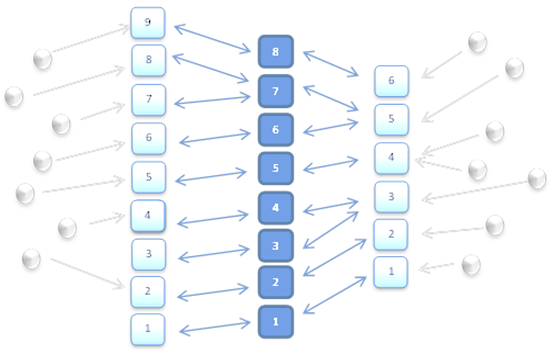
In the long-term, AQRF could potentially serve as a meta-framework to support the recognition of its levels against other Regional Qualifications Framework (RQF) and inter-regional recognition. Interested AMS can choose to begin referencing according to their readiness.
How does AQRF support NQF?
Recognising the difference in development stages – with some AMS having established comprehensive NQF, others with sectoral frameworks, and some do not yet have any – AQRF aimed to support and enhance AMS NQF or NQS by offering a mechanism to facilitate comparison, transparency and higher quality qualifications systems. AQRF is underpinned by a set of agreed quality assurance principles and standards, and requires participating AMS to describe their education and training quality assurance systems.

Complementing MRAs
ASEAN Mutual Recognition Arrangements (MRA) aim to facilitate the mobility of professionals within ASEAN through the recognition of qualifications, experience obtained, requirements met, or licenses or certifications granted by the relevant authorities in an AMS for mutual recognition by other AMS. The AQRF complements and supports this process by enabling a broad comparison of qualifications across AMS.
Role of AQRF in ASEAN Community Building – An ASEAN Cross-sectoral Initiative
The AQRF aimed to support ASEAN Community building and specifically through the process to achieve the following goals:
- free flow of skilled labour (through harmonisation and standardisation) within the region, as indicated in the ASEAN Economic Community (AEC) 2015 Blueprint; and
- ASEAN Socio-Cultural Community (ASCC) 2015 Blueprint which seeks “to establish national skills frameworks as an incremental approach towards an ASEAN skills recognition framework”.
With the launch of the AEC and ASCC Blueprints 2025, AQRF will continue to play an important role in facilitating the seamless movement of skilled labour within ASEAN towards a highly integrated and cohesive economy, and human capacity development respectively.
Above all, AQRF is an initiative in line with the ASEAN Charter’s objective to develop human resources through closer cooperation in education and life-long learning to empower the peoples of ASEAN and to strengthen the ASEAN Community.
In short, AQRF is a unique ASEAN’s cross-sectoral and cross-pillar initiatives and plays an important role in supporting ASEAN Community building.
Latest Developments
The establishment of the AQRF Committee and the inauguration of its first Meeting on 9-10 February 2017 marked a milestone for ASEAN. The AQRF Committee is responsible for considering referencing reports submitted by participating AMS. All interested AMS are invited to express their intent to reference their NQF to AQRF.
Background and Acknowledgement
Recognising the coverage of a RQF and its impact on various sectors, a Task Force on AQRF (TF-AQRF) was created in 2013 under the auspice of ASEAN-Australia-New Zealand Free Trade Area (AANZFTA) Economic Cooperation and Work Programme (ECWP) to take on the task to develop the AQRF. The TF-AQRF comprised representatives from ASEAN ministries of trade, education, and labour or manpower, qualification, accreditation and relevant agencies. As AANZFTA Parties, representatives from Australia and New Zealand formed part of the TF-AQRF as non-voting members.
The TF-AQRF played an important coordinating role between and across the relevant ASEAN sectoral bodies, international organisations, as well as related regional initiatives. This enhances synergy and ensures consistency and alignment with internationally agreed frameworks, principles or standards in the development of the AQRF.
Since 2011, AANZFTA Economic Cooperation Support Programme (AECSP) has rendered continuous support to the AQRF initiative from Education and Training Governance: Capacity Building for National Qualifications Framework (NQF) Phase I to IV. NQF Phase IV will run until June 2019, and aims to support the referencing process of at least two AMS. For more information on AANZFTA AECSP activities, please visit http://aanzfta.asean.org/
More questions?
For any questions on AQRF, please contact Services and Investment Division (SID) of the ASEAN Secretariat at AQRF-ASEC@asean.org
Official Publications on AQRF:
AQRF Referencing Report of ASEAN Member States:
Latest News on AQRF:
- Press Release of the 6th AQRF Committee Meeting, 21-23 May, Luang Prabang, Lao PDR
- Press Release of the 5th AQRF Committee Meeting, 27-29 November, Bandar Seri Begawan, Brunei Darussalam
- Press Release of the 4th AQRF Committee Meeting, 14-16 May 2018, Bangkok, Thailand
- Press Release of the 3rd AQRF Committee Meeting, 14-16 November 2017, Manila, the Phillipines
- Press Release of the 2nd AQRF Committee Meeting, 12-13 July 2017, Manila, the Philippines
- Press Release of the 1st AQRF Committee Meeting, 9-10 February 2017, Jakarta, Indonesia
- Chairman’s Statement of the 28th and 29th ASEAN Summits, 6-7 September 2016, Vientiane, Lao PDR
- Joint Media Statement of the 48th ASEAN Economic Ministers Meeting, 3 August 2016, Vientiane, Lao PDR
- Joint Statement of the 9th ASEAN Education Ministers Meeting, 27 May 2016, Selangor, Malaysia
- Joint Communiqué of the 24th ASEAN Labour Ministers Meeting, 15 May 2016, Vientiane, Lao PDR
Endorsed AQRF Documents:
Documents developed by TF-AQRF and AQRF Committee:
- AQRF Referencing Guideline (August 2020)
- Concept Note 1 on AQRF Non formal and informal learning
- Concept Note 2 on AQRF learning outcomes
- Briefing Paper No. 1 on Qualifications Frameworks and Quality Assurance Systems
Other related ASEAN Documents:
What is AJCCM?
The ASEAN Joint Coordinating Committee on Medical Practitioners (AJCCM) is the committee under the Healthcare Services Sectoral Working Group (HSSWG) that discusses matters pertaining to facilitation of cooperation on Mutual Recognition Arrangements (MRA) on Medical Practitioners. Since the signing date, the following revision on Professional Medical Practitioner Regulatory Authority was made:
The Medical MRA was signed in March 2009. This Arrangement will facilitate the mobility of medical services professionals within ASEAN, enhance exchange of information and expertise on standards and qualifications, promote adoption of best practices for professional medical services and provide opportunities for capacity building and training of medical practitioners.
This MRA is also in accordance with the efforts of the ASEAN Member States in recognizing the ASEAN Vision 2020 on Partnership in Dynamic Development geared towards the creation of a stable, prosperous and highly competitive ASEAN Economic Region.
The mobility mechanism for ASEAN medical practitioners varies among the ten countries. The following links provide the mobility mechanism of the respective countries:
The AJCCM also regularly exchange information on the policies related to medical services. Among others:
Below are the links to each ASEAN Member State’s Professional Regulatory Authority for the Medical Practitioners: |
What is AJCCD?
The ASEAN Joint Coordinating Committee on Dental Practitioners (AJCCD) is the committee under the Healthcare Services Sectoral Working Group (HSSWG) that discusses matters pertaining to facilitation of cooperation on Mutual Recognition Agreement (MRA) on Dental Practitioners. Since the signing date, the following revisions on Professional Dental Practitioner Regulatory Authority were made:
The Dental MRA was signed in March 2009. This Arrangement will facilitate the mobility of dental services professionals within ASEAN, enhance exchange of information and expertise on standards and qualifications, promote adoption of best practices for professional dental services and provide opportunities for capacity building and training of dental practitioners.
This MRA is in accordance with the efforts of the ASEAN Member States in recognizing the ASEAN Vision 2020 on Partnership in Dynamic Development geared towards the creation of a stable, prosperous and highly competitive ASEAN Economic Region.
The mobility mechanism for ASEAN dental practitioners varies among the ten countries. The following links provide the mobility mechanism of the respective countries:
The AJCCD regularly exchange information on the policies related to dental services. Among others:
As part of an on-going effort to further improve standards in healthcare services, AJCCD has finalised and adopted ASEAN’s Dental Practice Standard. ASEAN Member States are expected to start integrating elements of the Standards into their respective practice standards. At the 22nd AJCCD meeting in November 2018, ASEAN Member States adopted the ASEAN Minimum Common Competency Standard for dental undergraduate education including the scope of performing abilities for each competence. Furthermore, for clarity, the AJCCD also adopted the glossary of terms. |
What is AJCCN?
The ASEAN Joint Coordinating Committee on Nursing (AJCCN) is the committee under the Healthcare Services Sectoral Working Group (HSSWG) that discusses matters pertaining to facilitation of cooperation on Mutual Recognition Arrangements (MRA) on Nursing Services. Since the signing date, the following revision on Professional Nursing Regulatory Authority was made:
The Nursing MRA was signed on December 9, 2006. This Arrangement will facilitate the mobility of nursing services professionals within ASEAN, enhance exchange of information and expertise on standards and qualifications, promote adoption of best practices for professional nursing services and provide opportunities for capacity building and training of nurses. Summary of the AJCCN Achievements 2007-2015 both at regional and national level can be downloaded here.
This MRA is also in accordance with the efforts of the ASEAN Member States in recognizing the ASEAN Vision 2020 on Partnership in Dynamic Development geared towards the creation of a stable, prosperous and highly competitive ASEAN Economic Region.
At its 6th Meeting held on 10-11 November 2009 in Vientiane Loa-PDR, the AJCCN agreed on 5 domains of the ASEAN Nursing Common Core Competencies as follows:
- Ethics and Legal Practice
- Professional Nursing Practice
- Leadership and management
- Education and Research
- Professional, Personal and Quality Development
The mobility mechanism for ASEAN nurses varies among the ten countries. The following links provide the mobility mechanism of the respective countries:
The AJCCN also regularly exchange information on the policies related to nursing services. Among others:
Following are useful information provided by relevant Professional Nursing Regulatory Authorities of ASEAN Member States:
- Brunei Darussalam
- Cambodia
- Indonesia
- Lao PDR
- Malaysia
- Diploma: http://nursing.moh.gov.my/wp-content/uploads/2017/03/Tempoh-Akreditasi-Bagi-Program-Diploma-in-Nursing-27032017.pdf
- Advanced Diploma: http://nursing.moh.gov.my/wp-content/uploads/2017/03/Tempoh-Akreditasi-Bagi-Program-Adv-Diploma-in-Nursing-27032017.pdf
- Bachelor: http://nursing.moh.gov.my/wp-content/uploads/2017/03/Tempoh-Akreditasi-Bagi-Program-Bachelor-in-Nursing-27032017.pdf
- Myanmar
- Philippines
- Singapore
- Thailand
- Viet nam
Logistics and Transport Services Sectoral Working Group
In the past decade, ASEAN logistics market expands significantly, alongside various Free Trade Agreements being implemented within ASEAN as well as with ASEAN Dialogue Partners such as China, Korea, Japan, India, Australia and New Zealand.
Noting this development, in 2006, ASEAN Economic Ministers decided Logistics Sector as the twelfth Priority Sector in ASEAN for accelerated economic integration, in addition to the eleven priority sectors identified in 2003.
The Roadmap for the Integration of Logistics Services was adopted in 2007. It contains specific measures which were formulated in consultation with both, government and business sectors. Aiming to (1) Create an ASEAN single market by 2015 by strengthening ASEAN economic integration through liberalisation and facilitation measures in the area of logistics services and (2) Support the establishment and enhance the competitiveness of an ASEAN production base through the creation of an integrated
ASEAN logistics environment.
The Roadmap sets five main targets:
- Achieve substantial liberalisation of logistics services
- Enhance Competitiveness of ASEAN Logistics Services Providers through Trade (including Documentation Simplification) and Logistics (Transport) Facilitation
- Expand Capability of ASEAN Logistics Service Providers
- Human Resource Development
- Enhance Multi-Modal Transport Infrastructure and Investment
Being one of the Implementing Bodies of the Logistics Roadmap, ASEAN Coordinating Committee on Services (CCS) agreed to establish the Logistics and Transport Services Working Group (LTSSWG) to implement the measures under the Logistics Roadmap which are related to CCS. The LTSSWG was established and held its first meeting on 1st– 2nd July 2009 in Bagan, Myanmar.
As an initial step towards implementing the Logistics Roadmap, the LTSSWG collects relevant information regarding Logistics and Transport Services in ten ASEAN Member States:
- Domestic Regulation related to Logistics Services
a. Brunei Darussalam
b. Cambodia
c. Indonesia
d. Lao PDR
e. Malaysia
-
-
- Port Authorities Act 1963
- Penang Port Commission Act 1955
- Bintulu Port Authority Act 1981
- Carriage of Goods By Sea Act 1950
- Merchant Shipping Ordinance 1952
- Port (Privatisation) Act 1990
- Privatisation of the Federal Ports (Concession Agreement)
- Customs Act 1967
- COGSA 1950
- Land Public Transport Act 2010
- Postal Services Act 2001
- Standards of Malaysia Act 1996
- Merchant Shipping Ordinance (MSO) 1952
- Railways Act 1991
- Road Transport Act 1987
-
f. Myanmar
g. Philippines
h. Singapore
i. Thailand
j. Viet Nam
- Contact Points for Investment Regulation and Licensing Registration.
- Business Registration Procedures.
- Definition of Express Delivery Services (EDS).
- Private Sector Associations in Logistics and Transport Services.
- Policies on Transportation of Empty Container.
- Coordination Mechanism for Logistics Sector
- Brunei Darussalam
- Cambodia
- Indonesia
- Lao PDR
- Malaysia
- Myanmar
- Philippines
- Singapore
- Thailand
- Viet Nam
- Logistics Services Market Access & Contact Details
Activities
- Conference on Enhancing ASEAN Logistics Services, 28-29 April 2014, Cebu, Philippines
Outcome: Key Issue Paper - Seminar on Enhancing ASEAN Logistics Services, 1-2 May 2014, Cebu, Philippines
Outcome: Report of the Enhancing Logistics Services Seminar - Logistics and Transport Confrence to Exchange Best Practices on Reulations and Experiences in ASEAN Regions, 10-11 December 2014, Ha Noi, Viet Nam
Outcome: Report of Logistics and Transport Conference to Exchange Best Practices on Regulations and Experiences in ASEAN Region
Annexes
- ASEAN Integration in Services (2021)
- ASEAN Services Report (2017)
- ASEAN Integration in Services (December 2015)
- ASEAN Services Integration Report
- Handbook on Liberalisation of Professional Services Through Mutual Recognition in ASEAN: Engineering Services
- Handbook on Liberalisation of Professional Services through Mutual Recognition in ASEAN: Architecture Services
- Handbook on Liberalisation of Professional Services Through Mutual Recognition in ASEAN: Accountancy Services
- Handbook on Liberalisation of Professional Services Through Mutual Recognition in ASEAN: Surveying Services
- ASEAN Integration in Services (September 2013)
- ASEAN Integration in Services (August 2009)
- ASEAN Integration in Services (April 2007)
- Requirements for International Trade in Services (Updated 2010)
- Directory of Associations of Service Suppliers
- Directory of Professional Associations
- The Second ASEAN Services Forum, “Raising the Competitiveness of ASEAN Services Industry”, Singapore, 9-10 May 2007
- ASEAN Forum on Trade in Services, “Towards a Free Flow of Services in ASEAN”, Viet Nam, 5-6 July 2005





